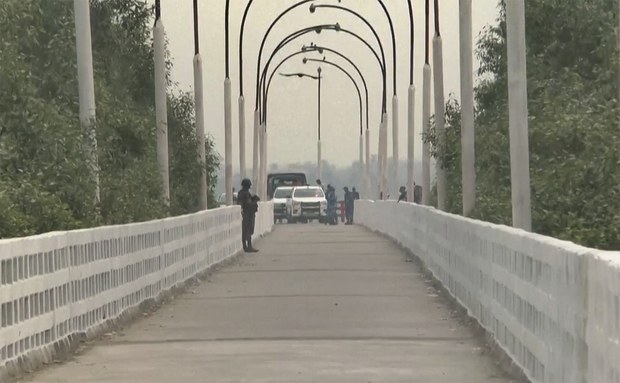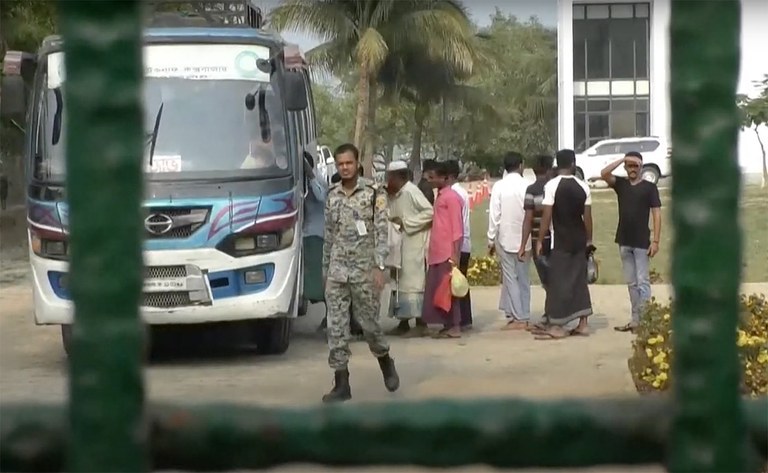UN refugee agency confirms involvement in junta boat transport
2023.03.20
Washington and Cox’s Bazar, Bangladesh
 Myanmar government representatives enter through a transit route linking Myanmar and Bangladesh in Teknaf, Bangladesh, March 15.
Myanmar government representatives enter through a transit route linking Myanmar and Bangladesh in Teknaf, Bangladesh, March 15.
The United Nations refugee agency has acknowledged it transported Myanmar junta officials aboard unmarked boats to Bangladeshi refugee camps last week, a move that has been criticized as risky to humanitarian workers and a “serious breach” of the agency’s neutrality.
UNHCR “supports efforts that could lead to the verification of all refugees and pave the way for eventual return,” the agency said in a statement on Sunday. “This most recently included providing logistical support to members of the Myanmar delegation to cross into Bangladesh for the technical verification process.”
The agency reiterated its previous assessment that conditions in Myanmar’s Rakhine state are “currently not conducive to the sustainable return of Rohingya refugees.”
U.N. boats – with markings removed from them – were used to carry officials from Myanmar’s ruling military junta to Cox’s Bazar in southeastern Bangladesh on Wednesday.
Junta officials have been negotiating a pilot project recently that would repatriate about 1,000 Rohingya from Bangladesh to Myanmar. Wednesday’s trip in the unmarked boats was made so officials could engage in talks and meet with refugees who could return under the pilot program.
Last week’s trip was made “in support of efforts to preserve the right to return” among the Rohingya, the UNHCR said in Sunday’s statement.
Consultation and dialogue with Rohingya in Bangladesh by all parties is “important to enable refugees to make an informed choice about return and build confidence amongst the community,” the agency said.

‘Refugees again and again’
One Rohingya leader did not seem surprised that the UNHCR would play a role in bringing the delegation from Myanmar to Bangladesh, even though the agency has said current conditions aren’t safe for repatriation.
“[T]he U.N. is not above suspicion,” Muhammed Jubair, the acting chairman of the Arakan Rohingya Society for Peace and Human Rights told BenarNews.
“The role of the U.N. was questionable during the repatriation of Rohingya in 1978 and 1992,” he said, referring to government-to-government repatriation programs that involved force or resulted in famine, according to humanitarian groups.
“That is why we have become refugees again and again,” he said. “We will become helpless if the U.N. works for the political interest of any country, whether Myanmar or Bangladesh. We hope the U.N. will show respect to us.”
A delegation from Myanmar has been in Bangladesh since Wednesday and has interviewed 475 members of 154 Rohingya families thus far, according to Md. Khalid Hossain, a member of Bangladesh’s Refugee Relief and Repatriation Commission. The Myanmar team will go home within a day or two, he said.
The Cox’s Bazar region, which borders Myanmar, houses about 1 million refugees from the persecuted Rohingya minority, including about 740,000 who fled Myanmar following a military crackdown in Rakhine state beginning in August 2017.
Kutupalong Rohingya camp resident Mohammad Hossain told BenarNews that the goal of the refugees is to eventually go back to Myanmar.
“We are expressing our thanks to Bangladesh for giving us shelter, but we are not good here,” he said. “We are not interested in coming back here again as refugees. In that case, our main place of trust is the U.N.”
“We expect a role from the U.N. that will be unequivocally humanitarian,” he added.
‘Reputational risk’
The U.N.’s resident coordinator in Myanmar, Ramanathan Balakrishnan, said in an email sent to colleagues on Thursday that the UNHCR and the World Food Program provided the boats last week “at the very firm request” of Myanmar junta officials. He also said he was worried the trip created a “reputational risk” for all U.N. agencies and could jeopardize staff security.
The email was obtained by the Myanmar Accountability Project and sent to Radio Free Asia (RFA), a news service affiliated with BenarNews.
Chris Gunness, a former U.N. official who is director of the London-based NGO, said last week that it was “extraordinary” that the U.N. officials, on the one hand, would make statements saying that the conditions in Rakhine are unsafe while also playing a supporting role in the junta’s pilot project.
Removing U.N. markings from the boats was “a serious breach of U.N. neutrality,” Gunness said.
“It puts in danger U.N. convoys across Myanmar,” he told RFA last week. “If rebel groups, if opposition groups and others feel that these transports, these aid convoys are being used by the junta to be transported, they may come under attack. And that puts at risk the lives of humanitarian workers across Myanmar.”







